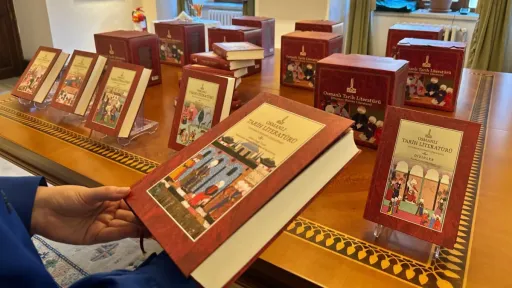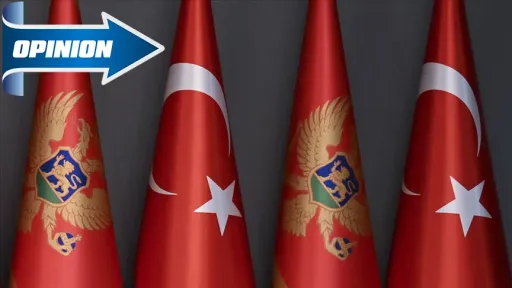IRCICA unveils six-volume catalog of Ottoman historical texts

The Research Centre for Islamic History, Art and Culture (IRCICA) has released a six-volume work considered one of the most comprehensive studies ever produced on Ottoman historiography, offering researchers a systematic catalog of historical texts written across the vast geography once ruled by the empire.
The collection, titled "Osmanlı Tarih Literatürü" ("Ottoman Historical Literature"), classifies thousands of original and translated works, their authors and the intellectual contexts in which they were produced. IRCICA introduced the volumes at its headquarters in Istanbul’s Cağaloğlu district.
Participants examined the work prepared by researchers Mehmet Serdar Bekar and Veysel Bulut, specialists in Islamic and Ottoman historical literature. The project was edited by Professor Cengiz Tomar.
Speaking at the opening, IRCICA President Professor Mahmud Erol Kılıç said Bekar and Bulut were “the true heroes” of a project that took years of labor. He said the team consulted more than 13,000 manuscripts to complete the compilation.
“It became a rich resource that economic historians, Sufi historians, political historians and historians of institutions can all benefit from,” Kılıç said.
He added that once the work gains full recognition in academic circles, IRCICA plans to make it accessible electronically, similar to the Islamic Encyclopedia published by the Center for Islamic Studies (ISAM). “This is not a book of contemplation but a reference work,” he said. “We hope to prepare the digital version within a year so researchers can search names, regions and other details directly.”
Bekar said the compilation follows a chronological structure and includes every identifiable manuscript and printed text on history produced in the lands ruled by the Ottoman Empire.
“Over roughly six centuries and across three continents, we traced works whose texts – or at least their titles – survived through libraries, catalogs and biographical-bibliographical sources,” he said. “In this sense, the project constitutes a full corpus.”
While the largest portion covers political history, Bekar said the collection also includes works from various disciplines that critically examine the study of history itself. He added that although most works were written in Turkish and Arabic, texts in other languages spoken within Ottoman society were also identified.
To determine authors’ Ottoman identities, the team considered whether the region where a work was written was under Ottoman rule at the time. An exception was made for post-Ottoman memoirs and diaries written in the early Republic era by authors who personally witnessed the empire’s final decades.
Bekar said the project identified 4,351 authors and 13,335 works. Researchers documented 22,018 manuscript copies kept in 470 collections in Türkiye and abroad. Many collections in Istanbul were physically examined, while others were studied through catalogs, biographical sources and digital archives. In some cases, the team even contacted living relatives to verify death dates.
Bulut, who also worked on the project, said preparations began in 2017 and required years of intensive effort. He recalled working late into the night at the Süleymaniye Library and receiving special access during the pandemic to continue research.
“Each volume represents years of dedication, sacrifice and meticulous cooperation,” he said.
Following the introductory remarks, scholars including Professor Mehmet Ipşirli, Professor Abdülkadir Özcan and Professor Erhan Afyoncu offered assessments of the work. Özcan praised the project, noting the difficulty of accessing manuscripts from six centuries and across the empire’s far-flung regions. Afyoncu said IRCICA’s publications have long contributed to the study of Ottoman science and literature, adding that the new catalog will serve as a key handbook for researchers.
He said making the volumes available digitally would expand their usefulness and allow the catalog to be continuously updated.
About the work
Published by IRCICA, Ottoman Historical Literature compiles an annotated bio-bibliography of historical writing produced throughout the Ottoman Empire’s 600-year span. It includes original and translated works written from the early 14th century to the early 20th century across Anatolia, the Balkans, Eastern Europe, the Caucasus, Crimea, western Iran, the Middle East and North Africa.
The volumes provide detailed information on each work’s content, period, language, subject, manuscript copies, printed editions, translations and links to other sources. While political history represents the bulk of the material, the compilation also includes works related to Islamic history, world history, intellectual history, urban history, archaeology, numismatics, memoirs and travel literature.
AA

